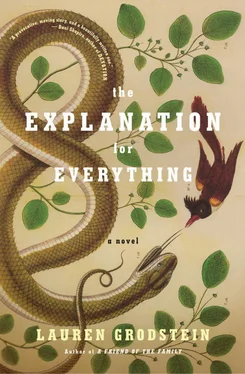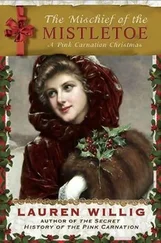Instead of answering, Anita stuck out her left hand, where a modest but not insignificant diamond was perched on the ring finger. And now Mrs. Lim couldn’t help it—she brought a hand to her chest to make sure what she was feeling was just a nervous flutter, not an attack.
“I asked your husband for permission last night,” Charles said. “I hope this is okay with you as well, Uhmuhni. ”
The Korean word for mother. “Of course,” Mrs. Lim said. “Oh, I am so happy.”
Forget the two hundred thousand dollars. It didn’t matter. Because now she really was so happy, planning the second family wedding of the year, and this time she had so much more to do with it, and this time—for the first time—she was included in the major affairs of Anita’s life. Although Anita still lived in Princeton, and Charles still lived in Rochester, the wedding was going to be held in Brooklyn, at the Bethany Presbyterian Church, and officiated by Eddie.
Pregnant Diana told them to hurry up and get it done so she could still fit into her bridesmaid’s dress when she walked down the aisle. A January wedding, then. Followed by a Hawaiian honeymoon, and then the couple would move to Rochester, where Charles would finish his term as an assistant pastor before moving on to a church of his own, or perhaps even doing missionary work. Charles had long felt a desire to spread the Word of God in Africa.
“And what about Princeton?” Mrs. Lim asked, cautiously, as she and Anita sat in the kitchen, addressing wedding invitations. “When will you finish your studies?”
“I’m not sure,” Anita said. She put down her pen, rested her cheek on her hand. Everything about Anita looked different than it had a year ago. Her hair was longer, falling in shiny sheets down her back. She’d started wearing contacts, so her eyes seemed more expressive, less obscured by the heavy black frames she’d favored since her freshman year at Stuyvesant. Her clothing too—where once she wore only the kind of clothing that made a girl disappear (dark turtlenecks, dark cords), now she wore knee-length skirts and open-collared shirts with patterns on them. She wore lipstick and high-heeled shoes and earrings and her diamond engagement ring. She looked, more and more, not at all like a scientist and a lot like a pastor’s wife.
Mrs. Lim neatly stacked her invitations back into the cardboard box they’d arrived in and reached out her hands for her daughter’s. This was a gesture she wasn’t used to making but it felt natural. Her daughter’s hands were so small and soft. Mrs. Lim didn’t say anything, but enjoyed the feeling of her daughter’s hands in her own.
“It’s, like, my entire life I was searching for something, you know? I kept searching and searching, thought I’d find it in school—thought I’d find out the reason that we were here, the reason that I’d been born in the first place. Because I wasn’t very happy, I don’t think. I couldn’t figure out the reason for my own life. But I thought if I could—maybe I wouldn’t be happy, but at least the world might make a little more sense.”
Mrs. Lim remembered Anita as a baby. So watchful. Never cried. Slept still as a stone.
“But no matter how much I studied, no matter how much I understood—no matter how many awards I won, even—I was never very happy. And it was only after I met Charles, after he opened up the way I saw the world—only then did everything start to make true sense to me. Only then did life fundamentally start to mean something to me.”
Mrs. Lim held tight to her daughter’s hands. “I understand,” she said.
“I know.”
They were quiet for a while. The kitchen in which Mrs. Lim had done so much raising of her family hadn’t changed much in the thirty years she’d been using it—same linoleum tile, same gray chipped counters, same view, out the back window, of the small, fenced-in yards of her Brooklyn neighbors, and the tall poles in each yard, with clotheslines controlled by pulleys—but Mrs. Lim noticed that the kitchen seemed new to her in some small way. She wanted to stand to make tea but she didn’t want to risk this sense of newness.
“I have to tell Hank, but he’s not going to understand.”
“He’s called me,” Mrs. Lim said.
“You?” Without their glasses to guard them Mrs. Lim could see worry in her daughter’s eyes. “He got your number?”
“He told me that you won two hundred thousand dollars.”
Anita took her hands back, shaded her brow for a second.
“That’s a lot of money.”
“I’m going to give it to Charles’s mission in Africa,” she said. “I mean, I know I’m supposed to use it for research, but I can get around that, I think. I’ll use a little for the wedding, and the rest of it will go to Charles.”
“You don’t have to use it for the wedding,” Mrs. Lim said. “We’re your parents. We’ll pay for that. Give it to the mission.” She said this even though she knew it meant that, with the money, the mission would take Anita to Africa, and she would lose her daughter just months after she had finally found her. But that was fine, that would be fine. She’d be closer in Africa in some ways than she’d ever been in Princeton. And hadn’t Mrs. Lim herself spent her adult life thousands of miles from her own mother? And though they’d missed one another, assuredly—hadn’t they both survived?
THREE WEEKS LATER, just before Thanksgiving, another phone call in the middle of the night. “Can you stop her, Mrs. Lim? She is destroying her life. She is destroying everything! You can’t let her go to Africa with that charlatan.”
“Do not call this number again,” Mrs. Lim whispered, her husband slumbering, snoring beside her. “Do not ever call this number.”
“I’m begging you,” said the voice. Was he drunk? He sounded drunk to her, or on drugs, some kind of drugs that made his voice waver and slur and go very quiet, and then start again. “You have to stop her, please. It’s your duty! I mean—your duty, Mrs. Lim, to free thought. To the world.”
“Do not call here,” she said.
“Mrs. Lim, I’m begging you.”
She hung up the phone.
WHAT HAPPENED IN the next few days was never entirely clear to Mrs. Lim, not in the years when she thought about it, nor in the years she spent trying to forget. Evidently Anita had returned to her hovel in Princeton and sat down with a Bible, a new shiny Bible that had been a gift from her brother. She stayed up all night—it must have taken her all night—going through it with scissors, cutting out every paragraph that contradicted what she had learned in her Ivy League schools about the history of the universe and the origin of man. When she was done with this exercise, the Bible almost came apart in her hands. Hundreds of paragraphs and even pages had been excised.
She brought this remnant of the Bible to Rosenblum. She said, “This is what your studies have done to the Word of God. I will not be part of this anymore.”
Rosenblum evidently picked up the Bible and threw it in the toilet. Although eviscerated, the book was still too big to flush down.
That afternoon, an e-mail was sent to Charles’s personal account, detailing Anita’s research into the viral origins of life, hundreds of millions of years ago. “You see?” said the e-mail. “This is the woman you will marry. This is what she truly believes.”
That evening, Rosenblum placed phone calls to Charles’s cell phone and his office in Rochester, but nobody picked up, and he left no voice mails.
The following day, quarter-page ads appeared in the Princeton Packet, the Trentonian, and the Rochester Democrat and Chronicle, accusing Charles Park, assistant pastor of the Bethel Mission Church, of brainwashing a certain Anita Lim, one of the most promising scientists of her generation. The ads also accused Pastor Park of stealing Ms. Lim’s two hundred thousand dollars of Kent-Hughes prize money and funneling it to his own mission in Africa. Photos of Charles, looking surly in his pastoral garb, were placed centrally in the ads.
Читать дальше












